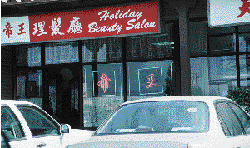THE JUDGE & THE CONVICT'S WOMAN
Page 7 of 13
Yan's wife Lu did testify. However, Trammell denied Reynold's request to cross-examine her regarding evidence that she and Yan may have tried to get money from Jin's family and from the investigating officers.
| The verdict required the judge to sentence both Jin and Chu to spend the rest of their lives in prison. |
Some hours into deliberation, the foreman buzzed the bailiff and complained to the judge that one of the jurors was refusing to deliberate. The judge called a few of the jurors individually into his chambers and interviewed them. The dissenting juror against whom the foreman had made the complaint responded with a complaint of his own about the misconduct of the other jurors. Without looking into those complaints, the judge dismissed him and swore in one of the jurors who had been following the trial and deliberations as an alternate. In a trial of any length, one or more alternates are selected to sit with the dozen impaneled jurors so they can step in in case one or more of the impaneled jurors are unable to complete deliberations.
A short time after the dissenting juror was dismissed, the jury came back with its verdicts: Jin was guilty of all counts and Chu guilty of kidnapping for extortion and residential robbery and innocent of assault with a semi-automatic weapon. The dismissed juror, Reynolds believes, was likely a lone holdout whose continued presence would have given his client a hung jury.
Under California Penal Code section 208 simple kidnapping normally carries a three, five or eight-year sentence. However, section 209 imposes a mandatory sentence of life without the possibility of parole where a kidnapping is for extortion and the victim is found to have suffered bodily injury. In this case, the jury found that Jin and Chu had kidnapped the Yans for the purpose of extorting a promise to drop criminal charges and that Yan's head injury constituted "great bodily injury". Under California law the verdict required the judge to sentence both Jin and Chu to spend the rest of their lives in prison.
Normally a judge pronounces sentence within hours, days or, at most, a few weeks of a verdict. In this case, however, what followed the July 9, 1996 verdict was a series of unusual events. The judge was merely putting into play his schemes to delay sentencing, believes Enid Ballantyne. His motivation? To prolong his grip over Jin's fate so as to continue his sway over Lo.
Regardless of Trammell's precise intentions, a series of unusual conferences followed the verdict. Judges scrupulously avoid conferring with either side on a case in the absence of the other side. Such one-sided ex parte communications are regarded as inherently suspicious and creating an impression of impropriety. On August 28, 1996, Trammell had an ex parte conference in his chambers with deputy DA Morrison. Two days later, he held separate ex parte meetings with both Jin and his attorney Reynolds and Chu and her attorney Ballantyne. Trammell then ordered the records of all three meetings to be sealed and kept confidential.

Ming Ching Jin was smooth, charming and liked by many in Southern California's Chinese immigrant community. As he awaited sentencing, the judge was presented dozens of letters attesting to Jin's warmth, generosity and charity, including two from this Rowland Hills barbershop.
He then held a hearing on September 13, 1996 in which he openly discussed his reservations about the life sentence that the verdict required him to hand down to Yu Ching Chu.
"The prosecutor, defense lawyer, judge, and investigating officer are all saying that somehow we have reached a bad result in the end, a bad potential result," Trammell said in open court. There was no disagreement with this observation. During the trial Deputy DA Larry Morrison had portrayed Jin as a cunning hardened criminal, but he was uncomfortable with a mandatory life sentence for Chu whom he saw merely as a junior accomplice. The only way to avoid dooming Chu to a life sentence was for Trammell to find grounds for declaring a mistrial, after which he could order a new trial.
During the trial, Trammell declared, he had seen some things that made him question whether Chu and Jin had not suffered from "ineffective assistance of counsel"--a clear slap at both Enid Ballantyne and Montie Reynolds. For that reason, the judge went on, he intended to appoint on behalf of each defendant a so-called second counsel to investigate ineffective assistance of counsel as a possible basis for a new trial motion. Appointment of second counsel wouldn't delay sentencing or the hearing of new trial motions, Trammell assured the defendants.
The Judge began asking around for a Chinese-speaking female attorney to appoint on Chu's behalf. Someone suggested a criminal defense lawyer named Karen Gee, a 37-year-old partner at Bensinger, Grayson & Ritt, a small Pasadena firm specializing in sexual harassment cases. Gee had gotten a BA from Yale and her JD in 1986 from top-ranked Boalt Hall. She had spent eight years getting trial experience in the public defender's office before joining Bensinger Grayson two years ago. A few months later she became a partner.
Trammell phoned Gee and asked her to come to his courtroom to discuss the assignment. Gee was reluctant to assume the second counsel seat. Aside from the fact that such assignments entail the unpleasantness of second-guessing another attorney's work, the state sets fees at $75 an hour, a far cry from Gee's usual $245. Page 8
| Page 1 | 2 | 3 | 4 | 5 | 6 | 7 | 8 | 9 | 10 | 11 | 12 | 13 |
CONTACT US
|
ADVERTISING INFO
© 1996-2013 Asian Media Group Inc
No part of the contents of this site may be reproduced without prior written permission.
